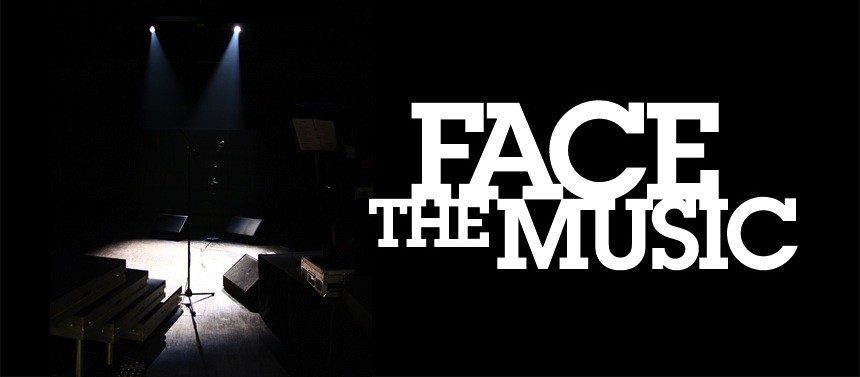(单词翻译:单击)
听力文本
Now, the VOA Learning English program Words and Their Stories.
There are so many expressions in American English that sound pleasant but are not.
"Face the music" is a good example. When someone says they have to "face the music," it does not mean they are going to a musical performance or concert.
"Facing the music" means to accept the unpleasant results of an action.
Americans often use the word "face" in this way. For example, "I can't face another night of camping! It's cold and rainy." Or "In life, it is important to face your fears."
Face used in this way is very common. But now, back to facing the music.

Imagine a friend asks you to take care of her beautiful red sports car.
She gives you the keys and says, "Thanks so much for watching my car while I'm away. But please, do not drive it. It is an extremely fast car and you are not on the insurance."
But you do not listen. You want to show off to some friends and pretend the car is yours. So, you drive it around town one night. As bad luck would have it, you lose control of the car and drive it into a stop sign.
The damage is severe. When your friend returns you must tell her what you have done and "face the music."
The "music" here is the consequence or result of your actions. It could be losing her friendship or paying for repairs to her sports car or both. Whatever the music is, you must face it.
Most Americans know the expression "face the music." It is more than 150 years old. As with many expressions, its history is not clear.
In 1851, the writer James Fenimore Cooper reportedly explained "face the music" as a theatrical term.
In a theater, the orchestra often sits in front of the stage. So, actors come on stage facing the musicians. Many actors are very nervous, a condition called stage fright. They may want to run away. Face the music came to mean accepting stage fright and not surrendering to it.
Word experts also say "face the music" may have come from the military.
A solider who did something terrible could be forced out of the horse cavalry.
The army drummers would play a slow, sad beat. The soldier would be carried away seated backward on a horse and facing the music of the drums. Humiliating!
There are other American expressions that mean the same thing as face the music.
To "take your medicine" means to accept the results from something bad you have done. And if someone says, "You made your bed. Now lie in it," they mean you created a bad situation and now you will experience the results, or as we say in spoken American English, you must deal with it!
"Pay the piper" also means the same as "face the music." But, that expression has its own very interesting beginning. We will talk about that on another Words and Their Stories.
I'm Anna Matteo.
重点解析
1.as luck would have it 碰巧;真幸运
Then, as luck would have it, a Good Samaritan offered him a loan to buy a local diner.
很幸运的是,就在那时有个热心人借了一笔钱给他买下了当地的一个小饭馆。
2.show off 炫耀;卖弄
All right, there's no need to show off.
好啦,没有必要炫耀了。
3.horse cavalry 骑兵
Tank consigned horse cavalry to the pages of history.
坦克使骑兵成为明日黄花。
4.deal with 处理;涉及;做生意
...the way that banks deal with complaints.
······银行处理投诉的方式。
参考译文
现在是VOA学英语《词汇掌故》栏目时间。
美语里有很多听起来有趣实则不然的表达
"Face the music"就是个例子。当有人说他们得“face the music”,那并不意味着他们要去看一个音乐表演或者去听一场音乐会。
"Facing the music" 意思是接受一个行为带来的不愉快的结果。
美国人经常这样用“face”这个词。例如:“我忍不了多露营一晚了!这儿冷还下雨。”或者,“生活中,敢于面对恐惧很重要。”
“Face”的这种用法比较常见。现在,我们回到“面对不愉快的结果”上来。
假设你的朋友拜托你照看她漂亮的红色跑车。
她把钥匙给你并说:“太感谢你能在我离开的这段时间时候帮我照看车子了。但请不要开。它的车速非常快,你没有保险。”
但你没听她的话。你想向你的朋友炫耀,让他们以为车子是你的。所以,有天晚上你开着它在城里转了一圈。不幸的是,车子失控撞上了停车标志。
车子受损很严重。当你朋友回来时,你必须告诉她你所做的一切并且面对一切后果。
这里的“music”是指你的行为导致的结果。结果可能是失去友谊或者付修车费,或者这两个结果都会有。无论结果是什么,你都必须面对。
多数美国人都知道“face the music”的表达。它有150多年的历史了。相较于其他许多表达,它的历史不是很明朗。
据报道1851年作家詹姆斯·费尼莫尔·库柏解释说“face the music”是一个戏剧术语。
在剧院里,管弦乐队通常坐在舞台前面。所以,演员们上台就面对着音乐家们。许多演员因此非常紧张,这种情况被称为“怯场”。他们可能想逃走。这里“Face the music”意思就是接受对舞台的恐惧感,不向它妥协。
词汇专家说“face the music”也许出自军队。
一个犯大错的战士会被赶出骑兵营。
军队的鼓手会为此演奏慢且悲的节拍。这个战士会被带走并向后坐在马背上听着鼓声。真是耻辱啊!
也有其他表示“face the music”意思的美语表达。
“take your medicine”意思是接受你所做坏事的结果。如果有人说,“You made your bed. Now lie in it”,他们的意思是说你制造了一个糟糕的局面,现在你得自食其果了,或者正如我们美语里的表达,你必须处理它。
“Pay the piper”和“face the music”意思也一样,但这个表达的来历很有趣。我们会在下一期的《词汇掌故》里讲解。
我是安娜·马特奥。


